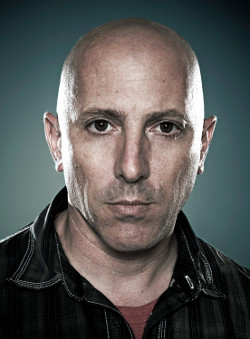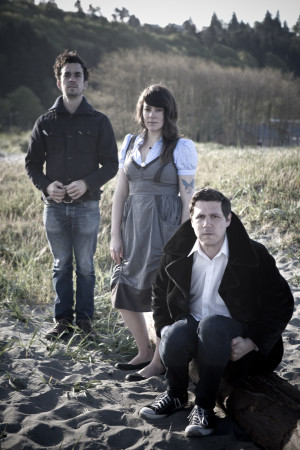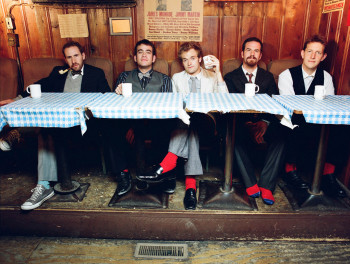Reclamation Project
 Describing the Shondes’ new album My Dear One, violinist Elijah Oberman noted in a recent interview that “it’s basically a break-up record. … We’re both happy and terrified to be participating in that tradition. On the one hand, it’s a very universal topic, and something that most people can relate to. And on the other hand, you really have to work to make it your own.” Mission accomplished. Because the New York-based band so masterfully blends its atypical identities into rock music, this break-up record sounds like no other.
Describing the Shondes’ new album My Dear One, violinist Elijah Oberman noted in a recent interview that “it’s basically a break-up record. … We’re both happy and terrified to be participating in that tradition. On the one hand, it’s a very universal topic, and something that most people can relate to. And on the other hand, you really have to work to make it your own.” Mission accomplished. Because the New York-based band so masterfully blends its atypical identities into rock music, this break-up record sounds like no other.

 One thing you might notice picking up Daniel Woodrell’s novel Winter’s Bone is how thin it is – less than 200 pages. And when you start reading, you might be struck that it’s been carved incredibly lean. While relatively plainspoken, the sentences are dense, with a mix of dialect from the Ozarks and artfully turned idioms that feel instantly right. One has to sip Woodrell’s language. “I do like to make it apparent to the reader that you need to probably read everything,” Woodrell said in a phone interview in April. “‘I won’t put in any flab, but you have to read what’s here’ is kind of my deal with the reader. … Pay attention to the sentences.”
One thing you might notice picking up Daniel Woodrell’s novel Winter’s Bone is how thin it is – less than 200 pages. And when you start reading, you might be struck that it’s been carved incredibly lean. While relatively plainspoken, the sentences are dense, with a mix of dialect from the Ozarks and artfully turned idioms that feel instantly right. One has to sip Woodrell’s language. “I do like to make it apparent to the reader that you need to probably read everything,” Woodrell said in a phone interview in April. “‘I won’t put in any flab, but you have to read what’s here’ is kind of my deal with the reader. … Pay attention to the sentences.”
 Writer/director David Spaltro’s debut feature
Writer/director David Spaltro’s debut feature  Maynard James Keenan – the frontman for prog-metal gods Tool, the co-leader of A Perfect Circle, and the founder of Puscifer – isn’t the type of person you’d expect to see as the subject of a thorough documentary. He has a reputation for being reclusive, and for jealously guarding his privacy. As he says in the movie Blood Into Wine, “I’m not much of a people person.” Yet Keenan, along with his wine-making partner Eric Glomski, is at the center of that documentary, a freewheeling but thoughtful mix of wine primer, underdog story, buddy picture, and sketch comedy.
Maynard James Keenan – the frontman for prog-metal gods Tool, the co-leader of A Perfect Circle, and the founder of Puscifer – isn’t the type of person you’d expect to see as the subject of a thorough documentary. He has a reputation for being reclusive, and for jealously guarding his privacy. As he says in the movie Blood Into Wine, “I’m not much of a people person.” Yet Keenan, along with his wine-making partner Eric Glomski, is at the center of that documentary, a freewheeling but thoughtful mix of wine primer, underdog story, buddy picture, and sketch comedy. On the 1996 benefit album Sweet Relief II: The Gravity of the Situation, the songs of Vic Chesnutt were covered by everybody from Madonna to R.E.M. to the Smashing Pumpkins to the Indigo Girls. Early in his career, the singer/songwriter was championed by Michael Stipe, who produced Chesnutt’s first two records, released in 1990 and 1991. PBS aired a documentary titled Speed Racer about his life. He had a small part in Sling Blade. He has collaborated with a diverse slate of artists from Widespread Panic to jazz guitarist Bill Frisell to the Cowboy Junkies to members of Fugazi and Godspeed You! Black Emperor. Chesnutt’s latest partnership is with the psychedelic-pop group Elf Power, part of the Georgia collective that spawned The Apples in Stereo and Neutral Milk Hotel. Chesnutt and Elf Power will be among the performers at a March 18 R.E.M. tribute concert at Carnegie Hall, at which they’ll perform “Everybody Hurts.” I start with the résumé because even if you’ve heard Chesnutt’s name, he’s not exactly famous. He has an immense reputation but a relatively small audience.
On the 1996 benefit album Sweet Relief II: The Gravity of the Situation, the songs of Vic Chesnutt were covered by everybody from Madonna to R.E.M. to the Smashing Pumpkins to the Indigo Girls. Early in his career, the singer/songwriter was championed by Michael Stipe, who produced Chesnutt’s first two records, released in 1990 and 1991. PBS aired a documentary titled Speed Racer about his life. He had a small part in Sling Blade. He has collaborated with a diverse slate of artists from Widespread Panic to jazz guitarist Bill Frisell to the Cowboy Junkies to members of Fugazi and Godspeed You! Black Emperor. Chesnutt’s latest partnership is with the psychedelic-pop group Elf Power, part of the Georgia collective that spawned The Apples in Stereo and Neutral Milk Hotel. Chesnutt and Elf Power will be among the performers at a March 18 R.E.M. tribute concert at Carnegie Hall, at which they’ll perform “Everybody Hurts.” I start with the résumé because even if you’ve heard Chesnutt’s name, he’s not exactly famous. He has an immense reputation but a relatively small audience. In April, Rick Moody fulfilled a fantasy that many artists surely have: He delivered a pie to the face of one of his critics. Moody is probably best known as the author of the 1994 novel from which director Ang Lee’s The Ice Storm was adapted. But he’s also famous in some circles for nine words written about him: “Rick Moody is the worst writer of his generation.”
In April, Rick Moody fulfilled a fantasy that many artists surely have: He delivered a pie to the face of one of his critics. Moody is probably best known as the author of the 1994 novel from which director Ang Lee’s The Ice Storm was adapted. But he’s also famous in some circles for nine words written about him: “Rick Moody is the worst writer of his generation.” For somebody who’s been compared favorably to Bruce Springsteen and Neil Young and Nick Drake,
For somebody who’s been compared favorably to Bruce Springsteen and Neil Young and Nick Drake,  The Ani DiFranco appearing on stages these days might not be the same Ani DiFranco who became something of a legend over the past two decades. The old Ani averaged a record a year from 1989 through 2006, toured incessantly, and was a punkish-folk, feminist, do-it-yourself, and bisexual icon. The new Ani has a 20-month-old child and a “baby daddy” (her words, referring to producer Mike Napolitano), and in September released her first studio album in two whole years: Red Letter Year.
The Ani DiFranco appearing on stages these days might not be the same Ani DiFranco who became something of a legend over the past two decades. The old Ani averaged a record a year from 1989 through 2006, toured incessantly, and was a punkish-folk, feminist, do-it-yourself, and bisexual icon. The new Ani has a 20-month-old child and a “baby daddy” (her words, referring to producer Mike Napolitano), and in September released her first studio album in two whole years: Red Letter Year. Chris Thile doesn’t like musical boundaries, and the mandolin player seems to almost relish pissing off those who would prefer to pigeonhole him.
Chris Thile doesn’t like musical boundaries, and the mandolin player seems to almost relish pissing off those who would prefer to pigeonhole him.